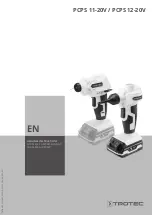
SYMPTOMS
POSSIBLE CAUSES
Thermal overload protection trips.
Oil level low.
Wrong direction of rotation.
Pressure switch failure/motor overload.
High oil consumption.
Air filter clogged.
Wrong type of oil.
Broken piston rings.
Oil pumping.
Air filter clogged.
Wrong type of oil
Oil level too high.
Piston scratched, worn or scored.
Noisy operation (knocking).
Loose drive pulley, coupling or excessive wear in
the motorshaft.
Loose fly wheel, drive belt loose.
Low oil level.
Milky oil in crankcase (water in oil).
High humidity. Change oil more frequently.
Oil in compressor air supply.
Air filter clogged, oil level too high.
Low air output.
Kinked hose, leaking connections.
Air filter clogged.
Piston rings broken or incorrectly seated in.
Cylinder or piston scratched, worn or scored.
Drive belt loose.
Excessive belt drive wear.
Belt loose - slipping, belt too tight.
Pulley and flywheel misaligned.
High moisture contents in air output.
Caused by high humidity. Drain any excess
moisture from receiver. Move to an area less humid.
Excessive starting and stopping.
High moisture content in receiver.
Air leaks in piping/connections.
Compressor will not start.
Power cable faulty, fuse blown, circuit breaker
open. Motor thermal overload protection tripped or
faulty. Pressure switch faulty. Check if the receiver
pressure is higher than the pressure switch cut-out
pressure (motor will re-start when the receiver
pressure drops below the cut-in pressure).
Air blowing from inlet.
Broken inlet valves.
Compressor runs continuously.
Defective pressure switch.
Compressor runs but does not produce air.
Check all valves are closed. Inspect all gasket in
case one is broken check drive belt is not slipping
or broken.
General air leaks.
These result from poor seals on some fittings.
IMPORTANT:
PLEASE NOTE ALL REPAIRS/ADJUSTMENTS SHOULD
BE CARRIED OUT BY A QUALIFIED PERSON.
TROUBLE SHOOTING GUIDE
- 11 -
POWER DIVISION HELP LINE:
01703 494344






























